170 – Time Bomb, Part 1 of 1
Welcome to Flash Pulp, episode one hundred and seventy.
![]()
Tonight we present, Time Bomb, Part 1 of 1.
[audio:http://traffic.libsyn.com/skinner/FlashPulp170.mp3]Download MP3
(RSS / iTunes)
This week’s episodes are brought to you by The Bothersome Things Podcast.
Flash Pulp is an experiment in broadcasting fresh pulp stories in the modern age – three to ten minutes of fiction brought to you Monday, Wednesday and Friday evenings.
Tonight, we present a strange interlude; a visitation to a secluded island, floating atop a sea of farmland.
Flash Pulp 170 – Time Bomb, Part 1 of 1
Written by J.R.D. Skinner
Art and Narration by Opopanax
and Audio produced by Jessica May
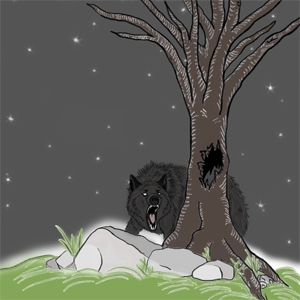 Abdi passed a man touching up a sign proclaiming “As for me and my house, we will serve the lord!”, and cursed gently into his phone.
Abdi passed a man touching up a sign proclaiming “As for me and my house, we will serve the lord!”, and cursed gently into his phone.
“I can’t get any proper ####ing reception, Allie. I’ll be home in an hour, tell him I said to put them back in the toy box, and if he still won’t, give him a time out and leave him there until he will.”
The painter threw a look over his shoulder and nodded a greeting. As he returned to his work, Abdi picked up his pace.
“Yeah, sorry, I know you don’t need me to-“
Allie’s response carried past a sun baked cow pasture. A lone black-and-white cud chewer took in the conversation intently.
“Hah. Yeah. I understand – it’s okay. Listen, I’ll cut this thing short, instead of hoofing it, I’ll give you a call and the two of you can come for an adventure and get me. I needed a little time to air the smell of gooed fruit loops from my brain, and I’d really like to look into this – I’m so close now, an hour more, tops.”
He smiled.
“Yep, promise – as soon as I’m done. Love you too. Bye.”
He pocketed his cell as the bovine gave him a skewed final gaze and turned towards a patch of taller weeds.
Retrieving a folded sheet of crumpled printer-paper from his pocket, he eyed his recently rejoined route. Country blocks didn’t allow a traveler many directional choices, but, despite his deceptively simple path, Abdi had spent the better part of the morning lost. He wasn’t eager to be thrown off course a second time by again missing a grown over trail that was somehow included in Google’s mapped directions.
Another half-hour brought him to a prodigious expanse of lawn – recently cut – and a two story house, made tiny to his eye by its distance on the far side of the grassy buffer. Behind it stood a massive barn edging on a sea of tall grain, and terminated on the horizon by dense forest. Abdi stopped at the head of the driveway to confirm the address against the crisply hand painted numbers on the pale gray mailbox, and considered the leagues of tar-paved drive.
Unable to locate a call-box, he ducked between the wide bars of the closed cattle gate that blocked the way, and resumed his pace.
Although he’d been walking since early morning, the approach to the residence seemed the longest of the distances he covered.
Initially, knocking at the side-entrance brought no response. Lacking a doorbell to try, he hammered harder.
Over his head, from an open window on the upper level, a man, sounding ancient, told him it was open.
Abdi could see no one beyond the white-lace curtain that waved with the breeze.
Shrugging, he pulled at the green-framed screen.
The first floor of the house was dense with knickknacks on shelving units erected in front of any sizable length of wall. The decorator was apparently a compulsive collector of spoons, dolls, and plates with prints of birds in vivid reds, blues and yellows.
He was reminded of a Somali proverb his parents had carried with them when they’d come to America, and had usually applied when discussing an Aunt they especially felt needed to be married: “a childless old lady is obsessed with seashells.”
Abdi assumed the pack rat was the woman he’d talked with earlier, Rosemary. Her excessive politeness, and un-joking use of the word “gosh”, had left him in mind of a bashful spinster, and the ornamentation only seemed to prove it. He hated to be a bother to someone so well mannered, but, still, as his choice to walk instead of drive had made him late, he was glad he’d haggled down the price while on the phone.
It was the male voice, though, that he continued to hear. He couldn’t make out what it was saying, but the occasional muffled exclamation was enough to bring him to a staircase.
As he rose above the tide of clutter, he noted that the ascent was decorated with a simple series of framed photographs. All of the same man, at first young, and in full dress uniform while sitting on the wing of a large plane. Then, with mud up to his neck and what appeared to be an ocean behind him and a trio of comrades beside – and another, a solo shot, on a sandy beach, shirtless and holding a vicious looking rifle. The final picture, at the landing, was a studio portrait, his uniform now crisp. Early age was creeping around his right eye, and the left side of his face covered in a web of partially-healed creases. Written in pen, in the bottom right-hand corner, was a name: “Merle”.
The second story’s surfaces were universally white, and the shaggy carpet, a worn brown.
Although he was presented with four options as to closed rooms, the hidden muttering assisted in making his selection.
Eager to get home, Abdi cleared his throat and gave a gentle double-rap to announce his presence.
Sitting before him, in a formerly-white shirt and black jogging pants which strained at their seams, was a much older, much wider, version of the combatant in the photos.
Merle grunted and a made a sound that started mushy and ended with an open vowel. It might have been Hi, Huh, or How, his visitor couldn’t tell. The chair that held the former-soldier’s girth gave a pained creak, and, with another snort, the old man was moving.
Unable to maneuver in the tight hall, Abdi led the way, walking with his body half turned to attempt and predict their destination. Stopping at a plain door, no different than the other three, Merle wrapped his palm around the handle, and twisted.
The room was surrounded with shelves, but, unlike the clutter of the first floor, each appliance seemed to be carefully placed, as if there was some strategy to their storage even if it wasn’t immediately obvious. The range of memorabilia was impressive, mixing devices with bright red Bakelite panels, radios with their cloth cross hatched covers well preserved, and even toys with shining chromed-exteriors. Abdi thought it unlikely anything in the space had been constructed before 1955.
Rosemary, who he now guessed to be Merle’s daughter, had said her father collected together the vintage items years ago, but she’d also left him with the impression that the old timer was incapacitated, and that her sales were an effort to pay for his medical care.
Whatever the case, his misgivings were washed away in his wonder at the array of classic knobs and gleaming dials.
It wasn’t until he was on the floor, with his right ear aching, that he realized something was dramatically wrong.
An ancient loafer, the leather cracking and peeling along the seams, lifted, then came down with jackhammer-purpose.
As the foot landed just wide of its target, Abdi crab walked towards the exit.
“FWAR GHLUS KWEPH.” Merle gurgled in rage.
Throwing open a cabinet, the old man suddenly had a shotgun in one hand, and shells in the other – it was only his pudgy fingers that bought his intended victim time.
Now panicking, Abdi had little interest in discerning the motivation behind the assault – instead he found his feet in the hall, and sprinted for the stairs. His peripheral view was temporarily eclipsed by the veteran’s mass, and the beach picture jumped from the wall with a clap, but his momentum carried him through his fear, and he ignored his sneakers – which he’d taken off upon entering the home – as he blurred past the tchotchkes and onto the drive.
At the mid-point, he realized he was still being chased. His eyes remained locked on the gray bars of the gate that marked the road, but the unintelligible string of gibberish, which came from behind him, gave some indication as to how distantly Merle was lagging. Although the gap only widened, the thought of the weapon in the deranged man’s hands made any span seem all too short.
Abdi thought of the baby. He thought of Allie. He thought of the wasted time he’d spent that morning – maybe his last – which he could have spent with his wife and child. As his cotton socks ripped, and his feet stung on the hot laneway, he wept – he wept, and he ran.
He was beginning to think he might just survive the ordeal when a pickup stopped on the far side of his destination.
A woman stepped out, and the tormented runner considered leaping for the ditch which flanked the field of green – before he could, however, the newcomer shouted to him.
“I am so sorry!”
The kindness was enough to bring him up short and consider his situation.
It was true that his pursuer was still coming, but the rotund man had barely covered a quarter of the expanse, and his bouncing gait was making it difficult to reload the opened shotgun, despite his constant effort.
Moving slower now, and attempting to catch his breath, Abdi climbed over the fence and circled the truck for shelter.
Her face filled with apologies, Rosemary joined him.
“Dad is like one of those World War II Japanese soldiers who kept on fighting, out on their own little islands, way after the war had ended. For him it’s always an August dawn in Somalia, back in 1993. It’s not his fault though, it’s the metal chunks in his brain. He thinks he’s still overseas and fighting. I never thought, though, that you -”
Behind the plastic frames of her glasses her eyes had been tracking her father’s progress, until, with a final huff, he’d collapsed onto the drive.
She bolted to his side, her sensible brown dress waving against the wind of her pumping legs.
“Fowup mugug,” he said, his mouth turned towards the tar-paved ground.
They were his final words – for Merle, the war had ended.
Flash Pulp is presented by http://skinner.fm, and is released under the Canadian Creative Commons Attribution-Noncommercial 2.5 License.
Text and audio commentaries can be sent to skinner@skinner.fm, or the voicemail line at (206) 338-2792 – but be aware that it may appear in the FlashCast.
– and thanks to you, for reading. If you enjoyed the story, tell your friends.
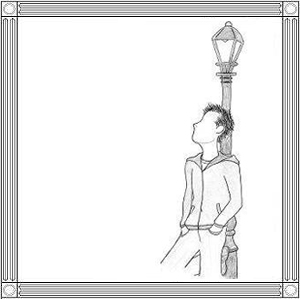 Mulligan didn’t know what he’d expected when he’d entered the shop’s kitchen, but it certainly wasn’t a weeping mother suckling a babe at her breast.
Mulligan didn’t know what he’d expected when he’d entered the shop’s kitchen, but it certainly wasn’t a weeping mother suckling a babe at her breast.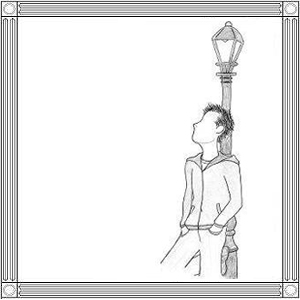 Three hours after the awkward discussion with his client, Mulligan Smith was standing in the building lobby of his only real lead, a behemoth of a fellow known locally as Ortez.
Three hours after the awkward discussion with his client, Mulligan Smith was standing in the building lobby of his only real lead, a behemoth of a fellow known locally as Ortez.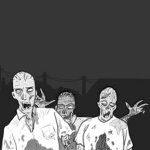
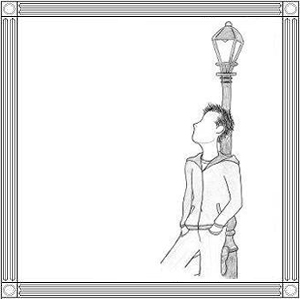 The only light in the Tercel came from the dash-panel’s green glow.
The only light in the Tercel came from the dash-panel’s green glow.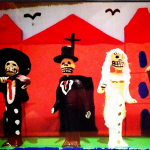 The two-story suburban home’s upper windows had shattered under the heat of the blaze, but those on the lower floor remained closed, except a single pane in the front living-room, which had been cracked against the vigour of the air conditioner, and now allowed an outlet for the black smoke column that blew outwards as if tainted-steam from a roiling kettle.
The two-story suburban home’s upper windows had shattered under the heat of the blaze, but those on the lower floor remained closed, except a single pane in the front living-room, which had been cracked against the vigour of the air conditioner, and now allowed an outlet for the black smoke column that blew outwards as if tainted-steam from a roiling kettle.